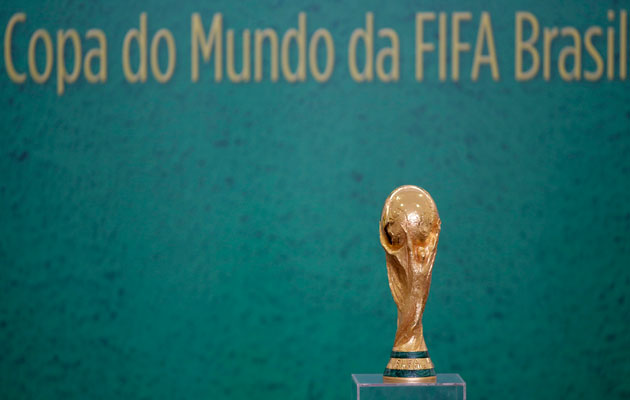Mexico remains as determined as ever, despite the political uncertainties, to win a share of host rights to the 2026 World Cup with the United States and, almost certainly, Canada.
Decio de Maria, president of the Mexican federation, said on the sidelines of the 2017 International Hall of Fame in Pachuca that all of the country wanted the opportunity to make football history several times over.
He added: “There is a political issue, of course, but we have plenty of time and this is talking about sport and a great opportunity for all our countries.”
No nation has hosted the World Cup finals on three occasions and Mexico are one of only five countries, along with Italy, France, Brazil and Germany, to have welcomed the world game twice.

Carlos Alberto holds the World Cup trophy aloft after Brazil’s victory over Italy in the 1970 final.
Mexico played host first in 1970 when Pele’s Brazil completed a famous hat-trick and then again in 1986 when Diego Maradona inspired Argentina to glory.
The political winds of change have played directly into Mexico’s hands. FIFA’s governing council decided last year that a rotation system ruled out European and Asian countries from bidding for 2026.
A subsequent council endorsement in January of an expansion to 48 teams and a relaxation of opposition to co-hosting threw the door wide open to a joint bid from the United States with Mexico and/or Canada.
Further, there is a powerful sentiment in the game that the US should certainly be a host in 2026 as amends for the controversial defeat by Qatar in the vote for 2022 undertaken by Sepp Blatter’s scandal-riven FIFA executive committee in December 2010.
The US is one of the few countries capable of staging a 48-team finals single-handed but regional politics favour a historic first three-way staging: regional confederation CONCACAF is headed by a Canadian in Victor Montagliani while Mexico has powerful television interests and wide Latin American support.
Only one potential barrier exists, literally, in the delicate state of United States-Mexico political relations after President Donald Trump’s declaration of intent to build a massive wall along the border and “make Mexico pay for it.”
De Maria, who succeded Justino Compean as FEMEXFUT president two years ago, believes that sporting interests on both sides of the Rio Grande can overcome political unpredictabilities.
He said: “We have been saying for the past five years that we wanted to try to host the World Cup in 2026 and nothing has changed our interest and determination.
“Our fans are excited about the chances to make football history by co-hosting and in seeing the Estadio Azteca become the first stadium ever to host matches in three different World Cups.
“We are in discussions about this. I think we get on well with the other federations and I am very positive about the idea. We have other excellent venues and, after all, Mexico is a football-crazy nation.”
In 1970 only 16 teams contested the World Cup and Mexico staged matches in five cities: Mexico City (Azteca), Guadalajara, Leon, Puebla and Toluca.

Diego Maradona with the World Cup after the 1986 final.
Then in 1986, after Mexico beat the US and Canada for the right to take over at short notice after Colombia withdrew, a 24-team competition was staged in 11 cities: Mexico City (Azteca and Olimpico Universitario), Guadalajara, Irapuato, Leon, Nezahualcoyotl, Puebla, Queretaro, San Nicolas de los Garza, Toluca and Zapopan.
De Maria, Compean and league president Enrique Bonilla were among directors of the Mexican game who attended the latest vote for new admissions to the International Hall of Fame based in Pachuca, Hidalgo province, some 60 miles from Mexico City.
The Hall of Fame was launched in 2011 by the Grupo Pachuca which has extensive local sports, property, academic and commercial interests. It owns not only FC Pachuca and Leon but has significant involvements in Chile’s Everton (Vina del Mar) and Argentina’s Talleres (Cordoba).
Next investment target for Grupo Pacheca supremo Jesus Martinez is a club in Brazil.
New Hall of Fame admissions included only one currently high-profile individual in Manchester City manager Pep Guardiola.
However his claim to fame was based not on his managerial exploits but on his playing career at Barcelona with whom he won a Champions League, six Spanish leagues, two domestic cups, four Supercups, one Cup-winners Cup and two UEFA Supercups. He also won Olympic gold with Spain in Barcelona in 1992.
Admissions list:
International football: Enzo Francescoli (Uruguay), Hristo Stoichkov (Bulgaria), Jorge Valdano (Argentina) and Pep Guardiola (Spain);
Mexican football: Ramon Ramirez, Carlos Miloc (died Feb 25) and Alberto Garcia Aspe;
International veterans: Francisco Gento (Spain), Ignacio Calderon and Guillermo Sepulveda (both Mexico); and
Women’s football: Birgit Prinz (Germany).







